| Total population | |
|---|---|
| 11,845 ( 2016 Census ) [1] | |
| Regions with significant populations | |
| Atlantic Canada · Quebec | |
| Languages | |
| French · Breton · English | |
| Religion | |
| Roman Catholicism, Druidry | |
| Related ethnic groups | |
| Bretons · French Canadians · Welsh Canadians · Cornish Canadians |
Breton Canadians are Canadian citizens of Breton descent or a Brittany-born person who resides in Canada.
According to the 2016 Census, 11,845 Canadians claimed that they had full or partial Breton ancestry. However, the Amicale des Parents d'Émigrés d'Amérique du Nord (Association of Relatives of Emigrants to North America), an organisation headquartered in Gourin, Brittany, has estimated that around 45,000 Bretons immigrated to Canada between the years of 1870 and 1980 and that 8,000 Breton Canadians live or work in the Montreal area. Moreover, many of the settlers during the French colonial era would hail from Brittany.
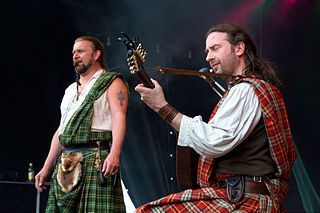
Celtic music is a broad grouping of music genres that evolved out of the folk music traditions of the Celtic people of Northwestern Europe. It refers to both orally-transmitted traditional music and recorded music and the styles vary considerably to include everything from traditional music to a wide range of hybrids.

Brittany is a peninsula, historical country and cultural area in the north-west of modern France, covering the western part of what was known as Armorica during the period of Roman occupation. It became an independent kingdom and then a duchy before being united with the Kingdom of France in 1532 as a province governed as a separate nation under the crown.
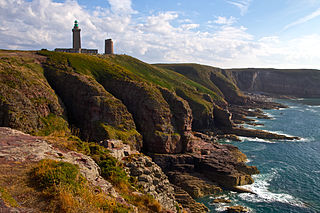
Brittany is the westernmost region of Metropolitan France. It covers about four fifths of the territory of the historic province of Brittany. It is one of two regions in Metropolitan France that do not contain any landlocked departments, the other being Corsica.

Loire-Atlantique is a department in Pays de la Loire on the west coast of France, named after the river Loire and the Atlantic Ocean. It had a population of 1,429,272 in 2019.
Allaire is a surname of French origin, mainly found in Northern France (Brittany), Jersey, and Quebec.
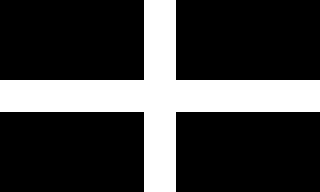
Saint Piran's Flag is the flag of Cornwall. The earliest known description of the flag, referred to as the Standard of Cornwall, was written in 1838. It is used by some Cornish people as a symbol of their identity.

The history of Brittany may refer to the entire history of the Armorican peninsula or only to the creation and development of a specifically Brythonic culture and state in the Early Middle Ages and the subsequent history of that state.

Cornouaille is a historical region on the west coast of Brittany in West France. The name is cognate with Cornwall in neighbouring Great Britain. This can be explained by the settlement of Cornouaille by migrant princes from Cornwall who created an independent principality founded by Rivelen Mor Marthou, and the founding of the Bishopric of Cornouaille by ancient saints from Cornwall. Celtic Britons and the settlers in Brittany spoke a common language, which later evolved into Breton, Welsh and Cornish.
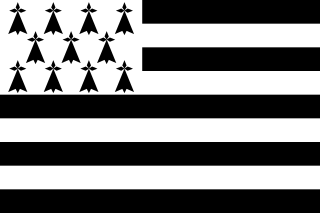
Breton nationalism is a form of regional nationalism associated with the region of Brittany in France. The political aspirations of Breton nationalists include the desire to obtain the right to self-rule, whether within France or independently of it, and to acquire more representation within the European Union, United Nations, and other international institutions.
The Breton Social-National Workers' Movement was a nationalist, separatist, and Fascist movement founded in 1941 by Théophile Jeusset. It emerged in Brittany from a deviationist faction of the Breton National Party; it disappeared the same year.
The culture of Brittany is the patterns of human activity and symbolism associated with the historical region of Brittany in northwestern France and the Breton people. Breton culture has been influenced by various local and nearby traditions over the centuries, including the Celtic culture of the Britons and Gauls and French culture to a lesser extent, particularly in Upper Brittany.

The Bretons are a Celtic ethnic group native to Brittany, north-western France. They trace their heritage to groups of Brittonic speakers who emigrated from southwestern Great Britain, particularly Cornwall and Devon, mostly during the Anglo-Saxon settlement of Britain. They migrated in waves from the 3rd to 9th century into Armorica, which was subsequently named Brittany after them.

The Kroaz Du is a flag of Brittany, used as an emblem of the independent duchy in the late Middle Ages. In the Breton language, kroaz means cross and du means black.

Morgan is a name of Welsh and Breton origin. Traditionally, it is a masculine-coded name in Wales and Brittany, but has been decoupled from its traditional gender outside of its regions of origin. It spread in popularity outside of Welsh and Breton communities during the past century, including in France, and in English-speaking countries worldwide. Morgan is also used as a surname, derived from the given name.
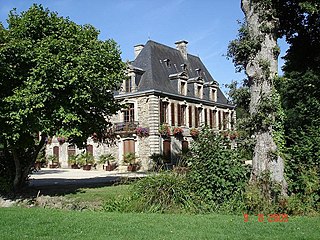
Gourin is a commune in the Morbihan département of Brittany in north-western France.
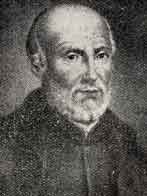
Julien Maunoir, was a French-born Jesuit priest known as the "Apostle of Brittany". He was beatified in 1951 by Pope Pius XII and is commemorated by the Catholic Church on 29 January and 2 July.
Loïc or Loick is a male personal forename chiefly used in Brittany, in western France, and in the Breton community in French-speaking countries.

Upper Brittany is the eastern part of Brittany, France, which is predominantly of a Romance culture and is associated with the Gallo language. The name is in counterpoint to Lower Brittany, the western part of the ancient province and present-day region, where the Breton language has traditionally been spoken. However, there is no certainty as to exactly where the line between 'Upper' and 'Lower' Brittany falls.

The Crêpe bretonne is a traditional dish in Lower Brittany, a region of France. It can be served plain, or filled with sweet or salty ingredients. The Crêpe bretonne can be made of wheat or buckwheat. This last is less well-known and should not be confused with the buckwheat pancake typical of Upper Brittany, which has a different recipe.